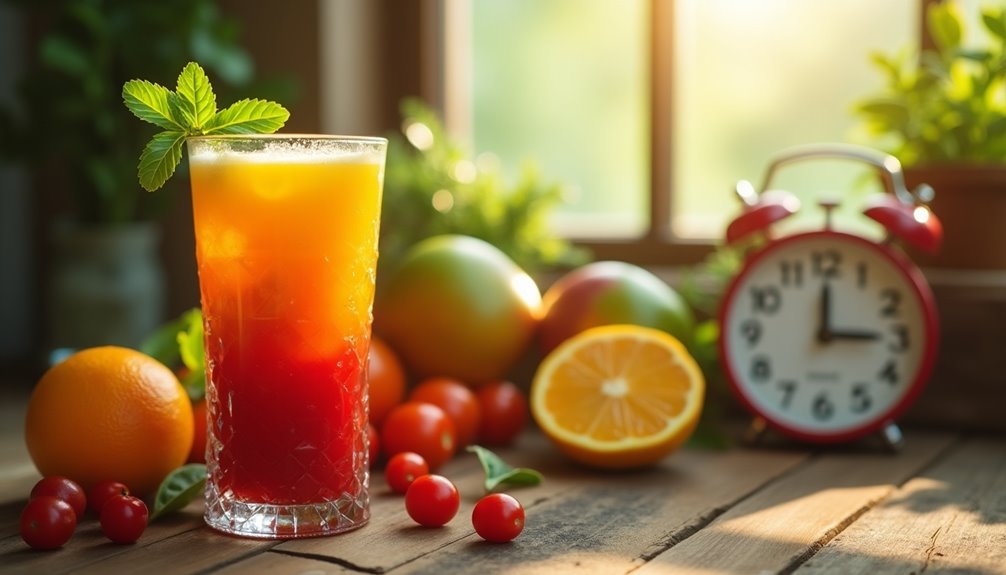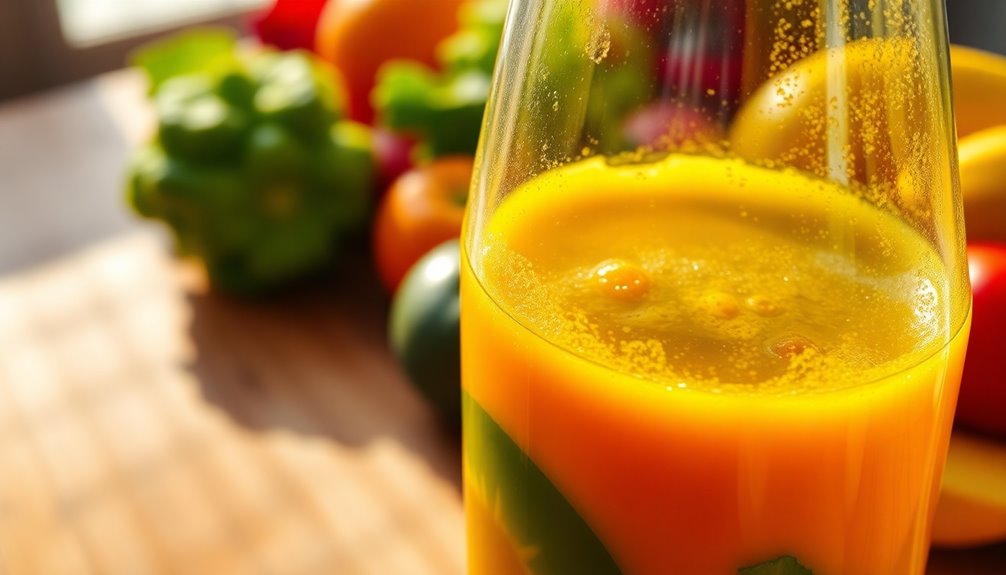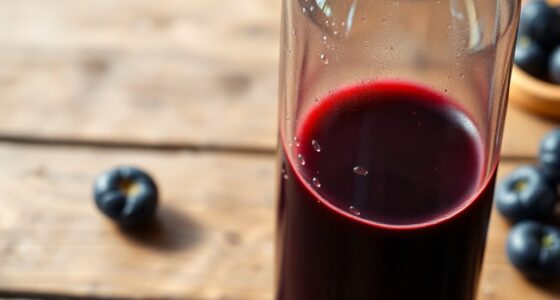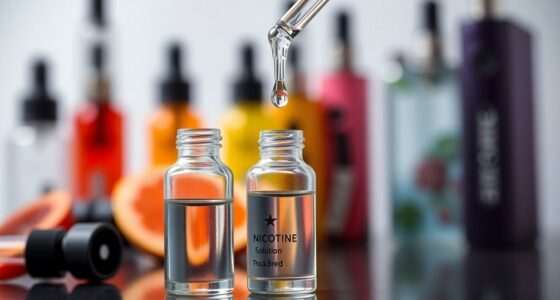Cold-pressed juice is good for about 3 to 5 days when refrigerated at the right temperature (34 to 40°F). After opening, try to consume it within this timeframe to enjoy its best flavor and nutrients. Vegetable juices generally last longer than fruit juices due to their lower sugar content. If you're curious about how to extend the shelf life or other storage methods, there's much more to explore on this topic.
Key Takeaways
- Cold-pressed juice typically lasts 3 to 5 days when refrigerated at 34 to 40°F for optimal freshness.
- Vegetable-based juices tend to have a longer shelf life than fruit-based juices due to lower sugar content.
- High-Pressure Processing (HPP) can extend the shelf life of juice by over 10 days but may affect nutrient density.
- Freezing cold-pressed juice can preserve its quality for 6 to 12 months when stored in airtight containers at 0°F or below.
- Always check the expiration date, as fruit juices generally spoil faster than vegetable juices.

When you grab a bottle of freshly cold-pressed juice, you probably want to know how long it'll stay fresh and tasty. The shelf life of cold-pressed juices is generally about 3 to 5 days when you keep them properly refrigerated at temperatures between 34 and 40°F. If you've got a busy week ahead, this timeframe might seem short, but it's crucial for preserving both the flavor and nutritional value of the juice. Once you've opened that bottle, consuming it within this window ensures you get all the goodness packed inside.
Now, if you leave your cold-pressed juice unrefrigerated, you should ideally drink it within 8 hours. After that, the quality begins to degrade quickly. The flavor changes, and the nutritional value diminishes, making it less beneficial for your health. It's a good idea to plan when you'll drink your juices so you can enjoy them at their best.
Interestingly, vegetable-based juices tend to last longer than fruit-based juices. This is mainly due to their lower sugar content, which can accelerate spoilage in fruit juices. So, if you're someone who loves the taste of green juices or blends with spinach and kale, you might find that they stay fresher a bit longer than their sweeter counterparts.
If you're looking for ways to extend the shelf life of your cold-pressed juice, consider High-Pressure Processing (HPP). This method can extend the shelf life by over 10 days compared to untreated juices. However, keep in mind that while HPP does help in prolonging freshness, it might compromise some nutrient density. If you're all about getting the maximum benefits from your raw cold-pressed juice, you may want to weigh the pros and cons of HPP against enjoying the juice in its most natural state.
Another option is freezing your cold-pressed juice. If you store it in airtight containers at 0°F or below, you can enjoy it for 6 to 12 months. This method preserves the quality and taste, allowing you to stock up on your favorite juices without the pressure of quick consumption. Just remember that when you thaw your juice, it's best to consume it as soon as possible for optimal freshness.
When checking the expiration date, always consider the type of juice you're drinking. Fruit juices generally spoil faster than vegetable-based juices, so keep that in mind when deciding what to buy. By understanding the shelf life of these juices, you can make the most out of your cold-pressed beverage experience, ensuring you savor every nutrient-packed sip while it's still fresh.
Frequently Asked Questions
How Long Do Pressed Juices Last in the Fridge?
Pressed juices typically last about 3-5 days in your fridge if you store them correctly.
Keeping them at temperatures between 34-40°F can help maintain their freshness.
If you notice any separation, a grayish color, or a strong fermented smell, it's time to toss them out.
Remember, sealing your juices in airtight containers can reduce oxidation and help them stay fresh for as long as possible.
Enjoy your juice while it's at its best!
How Long Can You Drink Fresh Pressed Juice?
When you drink fresh pressed juice, you want to enjoy its flavor, freshness, and nutrition.
You can sip on it for about 3-5 days if you keep it refrigerated. If it's been sitting out, make sure to finish it within 8 hours.
If you freeze it, you've got 6-12 months to savor it later.
Just watch for signs of spoilage like separation or off smells, and toss it if you notice anything unusual.
How to Know if Cold-Pressed Juice Has Gone Bad?
To know if your cold-pressed juice has gone bad, look for signs of spoilage.
If you see separation, brown foam, or a grayish color, it's likely oxidizing. A strong fermented smell is a clear indication that it's no longer safe to drink.
Mold is a definite no-go; discard any juice showing it.
To keep your juice fresh, always store it properly in the refrigerator and consume it within a few days.
How Long Do Press Drinks Last?
When you're enjoying pressed drinks, their longevity depends on storage.
Typically, if you keep them properly refrigerated, they can last about 3-5 days. If you freeze them in airtight containers, they might stay good for 6-12 months.
However, if you leave them unrefrigerated, try to drink them within 8 hours for the best taste and nutrients.
Always check for any signs of spoilage before consuming to ensure your drink's freshness.
Conclusion
In a world where fresh juice flows like the latest smartphone app, you'll want to savor that pressed juice quickly. Generally, it stays fresh for about 3 to 5 days in the fridge, but always trust your senses. If it looks cloudy or smells off, it's time to toss it. Enjoy the vibrant flavors while they're at their peak, and remember: fresh juice is like a good meme—best enjoyed before it goes stale!
Cindy thoroughly researches juicing trends, techniques, and recipes to provide readers with practical advice and inspiration. Her writing style is accessible, engaging, and designed to make complex concepts easy to understand. Cindy’s dedication to promoting the advantages of juicing shines through her work, empowering readers to make positive changes in their lives through the simple act of juicing.











